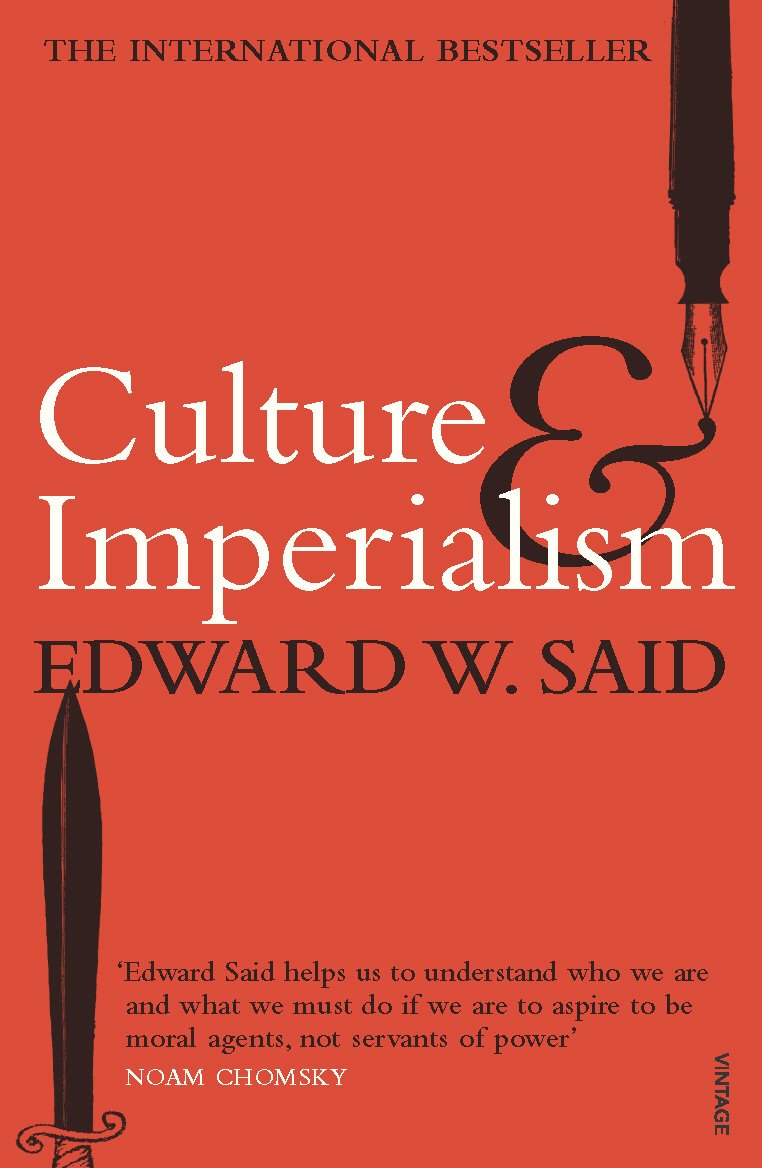Culture and Imperialism
- Brand: Unbranded

Description
Burney, S. (2012). Pedagogy of the other: Edward Said, postcolonial theory, and strategies for critique. Peter Lang. Edward Wadie Said a political activist literary critic 27 September 2003, The Independent. Accessed 7 February 2019 In Orientalism, Said described Bernard Lewis, the Anglo–American Orientalist, as "a perfect exemplification [of an] Establishment Orientalist [whose work] purports to be objective, liberal scholarship, but is, in reality, very close to being propaganda against his subject material." [41] :315 Said, Edward W. (24 October 2012). Culture and Imperialism. Knopf Doubleday Publishing Group. ISBN 9780307829658.
is more than that; he has entirely ignored the concept of customs, practices, and beliefs or perhaps, he has tried toHitchens, Christopher (26 September 2003). "A valediction for Edward Said". Slate. Archived from the original on 7 March 2023. To sum up, according to Edward Said, culture is the identification of a country. Imperialism, on the other hand, is no more than greed for power, resources, and land; therefore, it ruins the identification/culture.
John Cornwell (2010). Newman's Unquiet Grave: The Reluctant Saint. Continuum International Publishing Group. p.128. ISBN 9781441150844. A hundred and fifty years on, Edward Saïd, an agnostic of Palestinian origins, who strove to correct false Western impressions of 'Orientalism', would declare Newman's university discourses both true and 'incomparably eloquent'. ... Ali, Tariq (2003). "Remembering Edward Said, 1935–2003". New Left Review. 24: 59–65. ISSN 0028-6060. Archived from the original on 3 December 2022.Flaherty, Colleen (31 May 2017). "Why did Fresno State cancel a search for a professorship named after the late Edward Said?". Inside Higher Ed . Retrieved 4 December 2021. Turner, Bryan S; Rojek, Chris (2001). Society and Culture: Scarcity and Solidarity. SAGE. ISBN 9780761970491. Approaches to the History of the Middle East, Nancy Elizabeth Gallagher, Ed., London:Ithaca Press, 1994: pp. 144–45. Besides having been a public intellectual, Edward Said was an accomplished pianist, worked as the music critic for The Nation magazine, and wrote four books about music: Musical Elaborations (1991); Parallels and Paradoxes: Explorations in Music and Society (2002), with Daniel Barenboim as co-author; On Late Style: Music and Literature Against the Grain (2006); and Music at the Limits (2007) in which final book he spoke of finding musical reflections of his literary and historical ideas in bold compositions and strong performances. [87] [88]
In 1919, in partnership with a cousin, Wadie Said established a stationery business in Cairo. Like her husband, Hilda Said was an Arab Christian, and the Said family practiced Protestantism. [19] [20] Ferial Jabouri Ghazoul, ed. (2007). Edward Saïd and Critical Decolonization. American University in Cairo Press. pp.290–. ISBN 978-977-416-087-5 . Retrieved 19 November 2011. Edward W. Saïd (1935–2003) was one of the most influential intellectuals in the twentieth century. Said's childhood was spent in Cairo and Jerusalem; in 1947, he attended St. George's School, Jerusalem, a British-style Anglican school. By the late 1940s, Said's schooling included the Egyptian branch of Victoria College, where "classmates included Hussein of Jordan, and the Egyptian, Syrian, Jordanian, and Saudi Arabian boys whose academic careers would progress to their becoming ministers, prime ministers, and leading businessmen in their respective countries." [26] In 1951, Victoria College expelled Said, who had proved a troublesome boy, despite his academic achievements. He then attended Northfield Mount Hermon School, Massachusetts, a socially élite, college-prep boarding-school where he lived a difficult year of social alienation. Nonetheless, he excelled academically, and achieved the rank of either first (valedictorian) or second (salutatorian) in a class of one hundred sixty students. [27]
Additional Options
In all my works, I remained fundamentally critical of a gloating and uncritical nationalism. ... My view of Palestine ... remains the same today: I expressed all sorts of reservations about the insouciant nativism, and militant militarism of the nationalist consensus; I suggested, instead, a critical look at the Arab environment, Palestinian history, and the Israeli realities, with the explicit conclusion that only a negotiated settlement, between the two communities of suffering, Arab and Jewish, would provide respite from the unending war. [72] Bernstein, Richard (2003-09-26). "Edward W. Said, Polymath Scholar, Dies at 67". The New York Times. Archived from the original on 2016-03-04 . Retrieved 2008-10-21.
a b "Edward Said". Encyclopædia Britannica. Chicago: Encyclopædia Britannica, Inc. 16 February 2023 . Retrieved 31 July 2023.Richard T. Gray; Ruth V. Gross; Rolf J. Goebel; Clayton Koelb, eds. (2005). A Franz Kafka encyclopedia. Greenwood Publishing Group. pp.212–. ISBN 978-0-313-30375-3 . Retrieved 18 November 2011. In its current usage, Orient is a key term of cultural critique that derives from Edward W. Saïd's influential book Orientalism. a b c d e f Said, Edward (2003) [Reprinted with a new preface, first published 1978]. Orientalism. London: Penguin Books. ISBN 0141187425. Said surveys several canonical works to argue that they support imperialism by the way they ignore or amplify certain narratives including works of Rudyard Kipling, Jane Austen, Giuseppe Verdi and Albert Camus. Edward Said was considered "one of the most important literary critics and philosophers of the late 20th century". [10] Culture and Imperialism was hailed as long-awaited and seen as a direct successor to his main work, Orientalism. While The New York Times review notes the book's heavy resemblance to a collection of lectures, it concludes that "Yet that telegraphic style does not finally mar either the usefulness of 'Culture and Imperialism' or its importance." [9] The book is seen as a "classic study", [11] and has influenced many later authors, books and articles. [12] [13] Lewis, Bernard (24 June 1982). "The Question of Orientalism" (PDF). New York Review of Books . Retrieved 17 December 2017.
- Fruugo ID: 258392218-563234582
- EAN: 764486781913
-
Sold by: Fruugo
